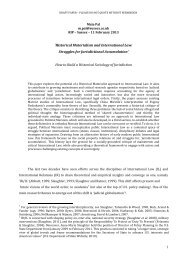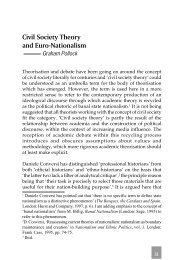Hannah Arendt's Concept of Responsibility - University of Sussex
Hannah Arendt's Concept of Responsibility - University of Sussex
Hannah Arendt's Concept of Responsibility - University of Sussex
Create successful ePaper yourself
Turn your PDF publications into a flip-book with our unique Google optimized e-Paper software.
‘[i]t would be <strong>of</strong> great “practical usefulness” for Germany today… if there<br />
were more … stories [like that <strong>of</strong> Schmidt] to be told’ (1994b: 233, original<br />
emphasis). Some people will not comply, she says; in other words, some people<br />
will take upon themselves the responsibility to act and change the human<br />
world - the actual situation and the meaning <strong>of</strong> membership itself (see also<br />
1987: 48).<br />
In the situations where Jews defended themselves, or where Germans saved<br />
Jews, the process similarly consisted <strong>of</strong> 1) a recognition <strong>of</strong> a natural given,<br />
since one does not choose to be born a Jew or a German, and 2) a change <strong>of</strong><br />
the meaning <strong>of</strong> this given through actions, individual and unique radical initiatives.<br />
Therefore, responsibility is the link between individual deeds, fellowship<br />
and membership. Political life consists <strong>of</strong> the transformation <strong>of</strong> identities<br />
through individual acts.<br />
<strong>Responsibility</strong> for the world<br />
Herzog: <strong>Hannah</strong> Arendt<br />
Eichmann’s case was more complicated than that <strong>of</strong> a regular criminal. He<br />
was guilty <strong>of</strong> ‘carrying out a policy <strong>of</strong> mass murder’ (1994a: 279), but there<br />
was something else:<br />
The longer one listened to him, the more obvious it became that his<br />
inability to speak was closely connected with an inability to think,<br />
namely, to think from the standpoint <strong>of</strong> somebody else. No communication<br />
was possible with him, not because he lied, but because he<br />
was surrounded by the most reliable <strong>of</strong> all safeguards against the<br />
words and the presence <strong>of</strong> others, and hence against reality as such<br />
(1994: 49).<br />
These sentences acquire their full meaning only when read in comparison to<br />
the following paragraph <strong>of</strong> ‘Truth and Politics,’ the essay that was written in<br />
response to the Eichmann controversy:<br />
Political thought is representative. I form an opinion by considering a<br />
given issue from different viewpoints, by making present to my mind<br />
the standpoints <strong>of</strong> those who are absent; that is, I represent them. This<br />
process <strong>of</strong> representation does not blindly adopt the actual views <strong>of</strong><br />
those who stand somewhere else, and hence look upon the world<br />
from a different perspective; this is a question neither <strong>of</strong> empathy, as<br />
though I tried to be or to feel like somebody else, nor <strong>of</strong> counting<br />
Studies in Social and Political Thought Page 49
















